20+ Sample Artist Management Agreement Templates
-
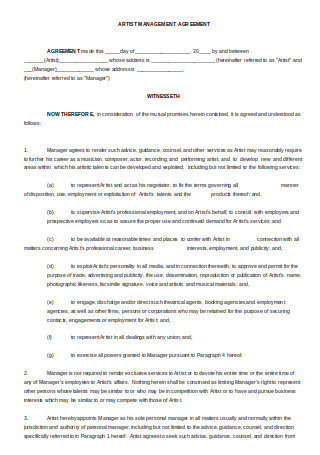
Artist Management Agreement
download now -
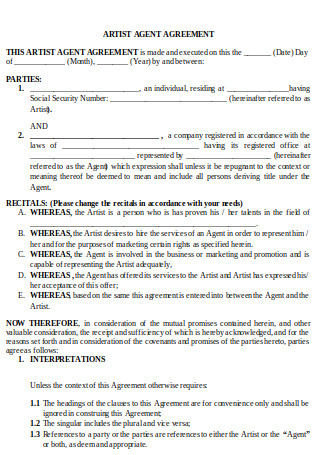
Artist Agent Agreement
download now -
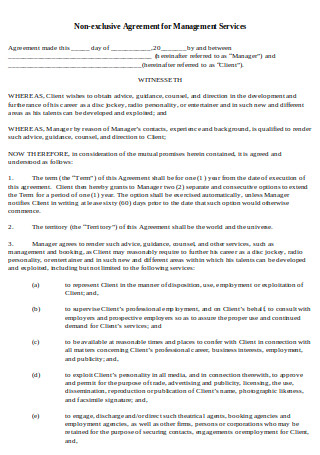
Non-exclusive Agreement for Management Services
download now -
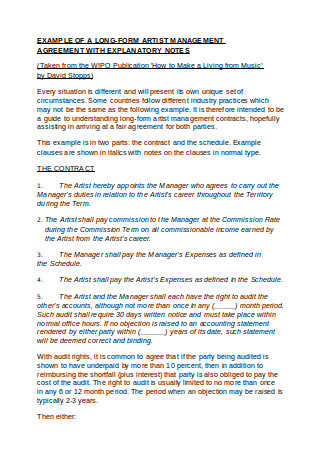
Artist Management Agreement Example
download now -
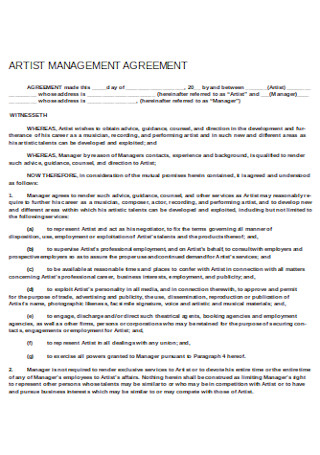
Sample Artist Management Agreement
download now -
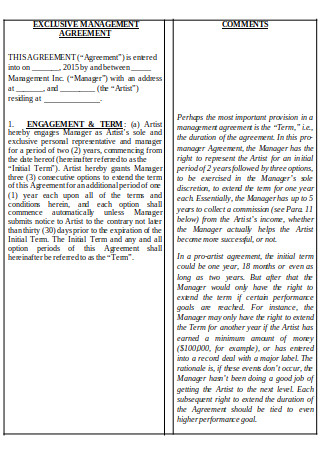
Exclusive Management Agreement
download now -
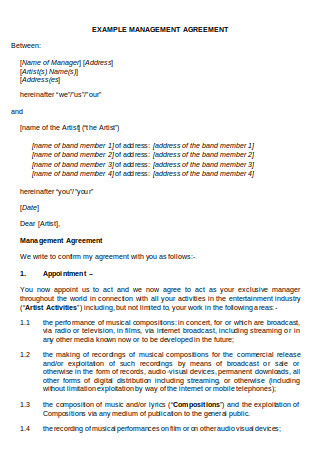
Example Management Agreement
download now -
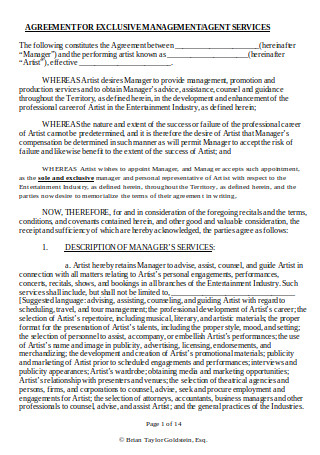
Agreement for Exclusive Management Services
download now -
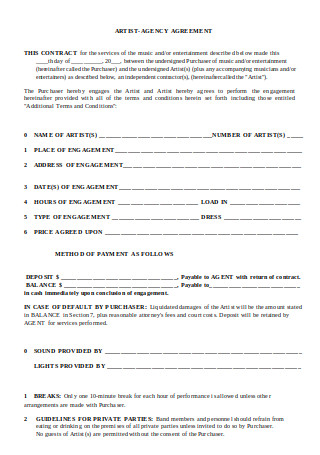
Artist Agency Agreement
download now -
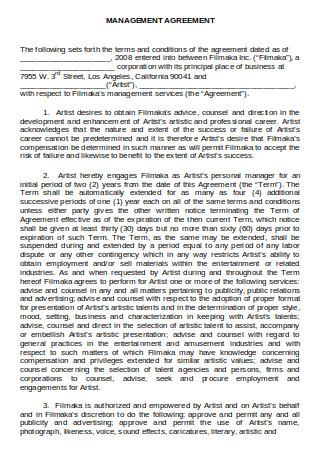
Management Agreement
download now -
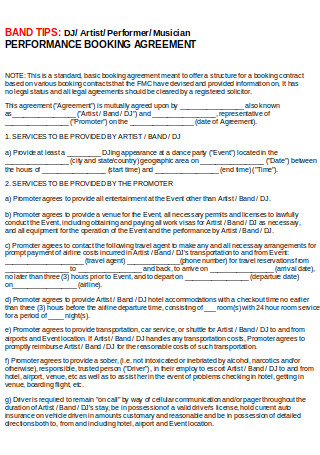
Basic Booking Agreement
download now -
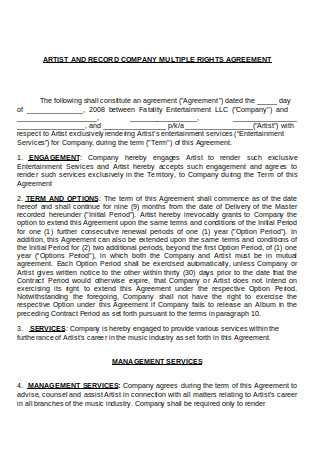
Artist and Record Company Agreement
download now -
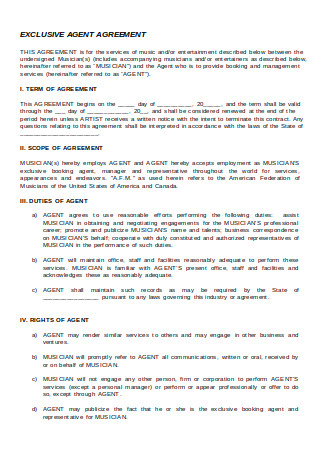
Exclusive Agent Agreement
download now -
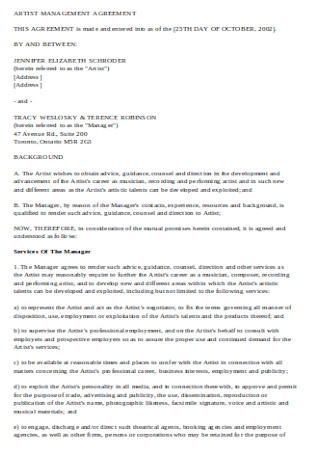
Simple Artist Management Agreement
download now -
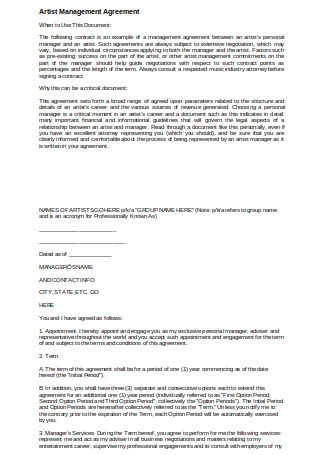
Artist Management Agreement Document
download now -
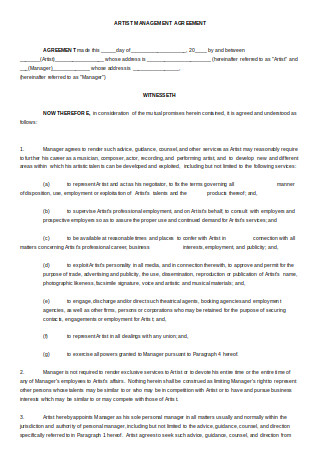
Editable Artist Management Agreement
download now -
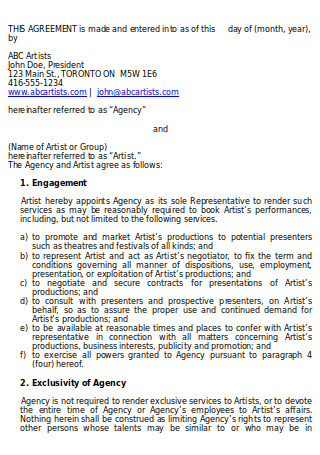
Agency Representation Agreement
download now -
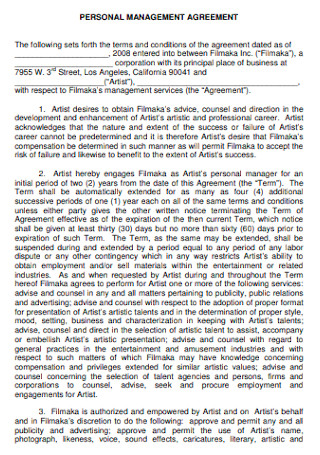
Personal Management Agreement
download now -
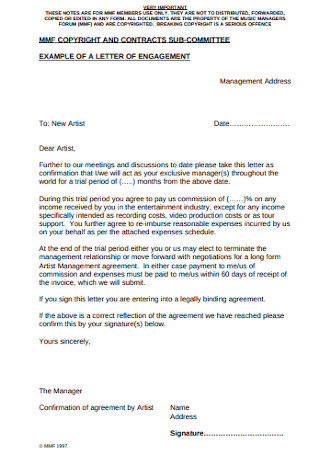
Short-Form Management Agreement
download now -
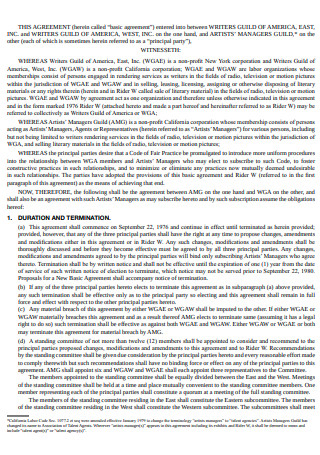
Basic Artist Manager Agreement
download now -
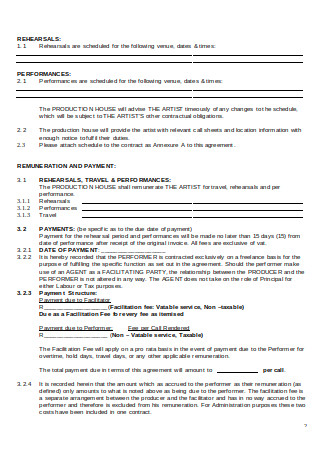
Theatre Performers Agreement
download now
FREE Artist Management Agreement s to Download
20+ Sample Artist Management Agreement Templates
What Is an Artist Management Agreement?
Artist Management Agreement: Why Is It Important?
The Essential Team Members of Every Artist’s Management
What Are the Significant Parts of an Artist Management Agreement?
How Do You Make a Standard Artist Management Agreement?
FAQs
What does a sunset clause mean?
Can an artist have two managers?
Should a manager have a license?

What Is an Artist Management Agreement?
Artists refer to actors, singers, dancers, or painters. And, the common denominator from them is by all involving the arts and entertainment industry. Indeed, you can say that artists are talented to have such a profession. But, arts or entertainment is not all about the fame and glamour. Substantial management is part of the deal too. However, it does not mean that an artist does all the work for managing. Someone is assigned for that job. The manager will guide and handle the significant decisions that will further boost the career out of these talents. Managers do not only utter their choices, though, because putting things into writing is required for compliance, proof, and documentation. This writing is where the artist management agreement comes into play to form an official contract between the talent and the manager. Moreover, the deal will cover management services from job obligations, commission, terms, and many more.
K-pop boy band sensation BTS achieved a Guinness World Record as the most viewed video on YouTube within 24 hours. Their Boy With Luv official music video, along with Halsey, reached a shocking 74,600,000 views. Meanwhile, the late Michael Jackson’s ‘Thriller’ remains as the bestselling album of all time with a 50-100 million sales globally. Albeit, ‘Their Greatest Hits’ by the Eagles holds a similar title but only in the U.S. According to Statista, a near $20 billion revenue was estimated for the U.S. music industry in 2018. In reference to the Business Insider, did you know that a survey proved how 91% of American consumers give consent to agreements without reading?
Artist Management Agreement: Why Is It Important?
According to Statista, a near $20 billion revenue was estimated for the U.S. music industry in 2018. With that said, the music management is no joke, and how do these musical artists cope with their professional careers and earnings? That is through the help of their manager. With an agreement, things get finalized from which entertainment company the artist is under. The same goes for how much the artist receives from the company or the promise of making sure the manager also gets a percentage of the artist’s earnings. Most importantly, it specifies the duration of when the contract or agreement remains valid. Without such a document, it is easy to create conflicts since the official ties between parties and related details are evident in the agreement.
The Essential Team Members of Every Artist’s Management
For every artist, there lies a team of professionals who help build the artist’s career, reputation, growth, or in short—success. Lacking some important people for the job may fail at reaching effective management, and you would not want that. For clarification on their roles and functions, take a look at the essential members who should be part of an artist’s team:
What Are the Significant Parts of an Artist Management Agreement?
After knowing the potential experts to work with from an artist’s team, the next concern is to ensure the talent management agreement’s clauses become familiarized. That way, you can identify what should become present from the contract and what each section entails. The critical parts of this particular agreement are the following:
Exclusivity
Any artist should assume that every manager has at least handled two or more talents. Thus, the brand management agreement must state what exclusive services are present for the artist that may not be found from other talents dealt by that manager. Artists deserve assurance for priority, and there might be other managers who lack commitment and have favoritism with other artists. The agreement works as the receipt to prove this exclusivity.
Management Specifics
Specific duties and tasks to be fulfilled by managers require an official statement, and it can work by adding it to the contract. For example, musical artists give authorization to music managers to handle their work. However, not knowing the manager’s responsibilities is risky for the artist’s side. There are even many talents that suddenly disappear from the spotlight. It could be they were not taken care of properly by their managers. This agreement should work out well if both parties are well-informed.
Decisions
Aside from understanding the entire job, what decisions get approved or disapproved need clarification on the management contract too. When a talent cannot make an appointment, does that mean that the manager gets appointed as a power of attorney already? It depends if such a condition is present in the document. A tip is to think of the pros and cons of every decision before signing the agreement to think it through.
Time
Any agreement has an inevitable end, and when the terms start and finish cannot ever be forgotten for an artist management contract as well. Maybe talents only receive exclusive perks and full-time management service for a specified period. Therefore, services would stop when the deadline is due. Confirm the dates as much as possible to avoid conflicting expectations.
Expenses
Real business starts with the expenses. Artists perform, and managers basically manage for the sake of earning from their profession. Management contracts will surely deal with the finances from the revenues, commissions, royalties, additional payments, and other factors. Without any estimation or figures in the contract, then who knows if the money you expect to earn from the service will stay like that the entire term?
How Do You Make a Standard Artist Management Agreement?
Whether you are the manager or the artist in a one-on-one meeting for an agreement signing, what matters is that you know the steps in creating the artist management agreement. On that note, it is easier to understand and familiarize what makes up such a form. Rest assured it will be simple after downloading the appropriate template from our samples and following this step-by-step guide next:
Step 1: Recognize Each Party
Have you finished choosing and downloading the template of your choice from our site yet? Good, you can now start tweaking its content, starting with identifying all parties. Provide questions related to personal information—name, contact number, address, and other relevant factors. With clarity on who is who, further questions need not be asked in identifying every party.
Step 2: Create a Contract Timeline
Agreements or contracts may be long term or short term, and it needs to get specified on the form. Otherwise, one party may be unaware of when the whole business takes place. If a manager promised to have a one-year contract, yet the written agreement stated that it covers for six years, then that is a problem once the artist blindly signs it.
Step 3: Define Job Expectations
What is the manager allowed and not to do? What activities should the talent establish aside from performing? Anything related to labor between parties requires a thorough explanation too. An example is when an artist is expected to be more than just a visual artist since he or she will be asked to do meet and greets and more services. If anyone disagrees with such expectations, then the signee should not sign the form.
Step 4: Prepare the Terms
The terms mark as the most important part of any agreement. Did you know that a survey proved how 91% of American consumers give consent to agreements without reading? Never let that same situation happen to anyone signing this management contract soon. Instead, you remind the signees that without setting rules, formal consequences may not be given to anyone who breaches the agreement. Think first. What are the prohibitions and rights of the talent? Will there be fines and court proceedings for certain illegal actions? Make a checklist for this to avoid forgetting anything and never forget to observe understandable details.
Step 5: Require a Signature
There is no manager or artist signing without an actual signature. Thus, you provide a signature line at the end of the whole sheet. You already know the vital parts of this agreement from exclusivity, management specifics, and the rest that got stated above. Next, you review if those were all present on the form. Providing the signature line is already applicable once those important parts are present to close the agreement.
FAQs
What does a sunset clause mean?
Sunset clause, in an artist’s management agreement, refers to how a manager can still receive a commission if the contract between a manager and an artist ends in the long run. If the artist continues to earn despite an expired contract, then he or she is still obliged to pay the manager with a reduced percentage.
Can an artist have two managers?
Yes, it is allowed since some artists even communicate with up to two managers. Hence, artists should be careful about how these managers work because maybe one manager is slacking off while the other is doing most of the work. Performers in an artist recording will have no choice but to share his or her royalties to the one who made little effort if both managers are part of the contract already.
Should a manager have a license?
According to Medium, there are talent agency laws in states already where a license turns required for managers and agents. Moreover, the license can be acquired depending on where the manager becomes employed at.
While most people see or recognize artists from record-breaking titles and never-ending fame, it does not mean that managers and other professionals behind the scenes will have their efforts barely acknowledged. There lies a chance for a better experience working in the industry with a positive relationship between artists and managers anyway. An artist will have to trust the manager’s plans. Meanwhile, the manager should consider what the artist is okay or not okay with too. In discussing these matters before a contract signing, rest assured that both parties can settle a better agreement.
